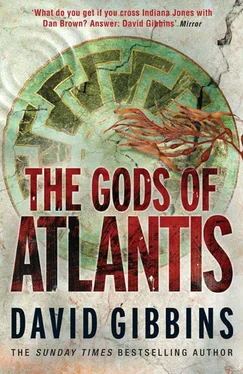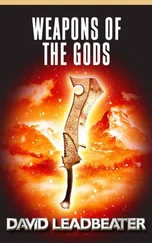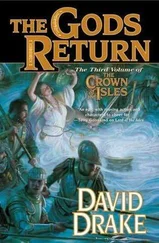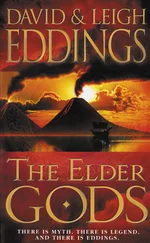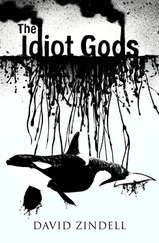David Gibbins - The Gods of Atlantis
Здесь есть возможность читать онлайн «David Gibbins - The Gods of Atlantis» весь текст электронной книги совершенно бесплатно (целиком полную версию без сокращений). В некоторых случаях можно слушать аудио, скачать через торрент в формате fb2 и присутствует краткое содержание. Жанр: Прочие приключения, на английском языке. Описание произведения, (предисловие) а так же отзывы посетителей доступны на портале библиотеки ЛибКат.
- Название:The Gods of Atlantis
- Автор:
- Жанр:
- Год:неизвестен
- ISBN:нет данных
- Рейтинг книги:3 / 5. Голосов: 1
-
Избранное:Добавить в избранное
- Отзывы:
-
Ваша оценка:
- 60
- 1
- 2
- 3
- 4
- 5
The Gods of Atlantis: краткое содержание, описание и аннотация
Предлагаем к чтению аннотацию, описание, краткое содержание или предисловие (зависит от того, что написал сам автор книги «The Gods of Atlantis»). Если вы не нашли необходимую информацию о книге — напишите в комментариях, мы постараемся отыскать её.
The Gods of Atlantis — читать онлайн бесплатно полную книгу (весь текст) целиком
Ниже представлен текст книги, разбитый по страницам. Система сохранения места последней прочитанной страницы, позволяет с удобством читать онлайн бесплатно книгу «The Gods of Atlantis», без необходимости каждый раз заново искать на чём Вы остановились. Поставьте закладку, и сможете в любой момент перейти на страницу, на которой закончили чтение.
Интервал:
Закладка:
‘Why now?’ Jack asked.
‘Because I am old, and sitting here looking over the ocean, imagining ancient explorers and seafarers, I dwell often in the past in Heidelberg, when I was so excited to be in that library. I took out this document a few days ago and smelt the old vellum of the codex. It brought it all back to me. That’s when I called my old friend James Dillen. I could not die without revealing this to someone. And there is a specific reason why I wanted it to be you.’
‘Let’s see it,’ Costas said, leaning forward on his elbows. Schoenberg took a deep breath, then reached in and pulled out two sheets from the envelope, placing them on top of the table. The upper sheet was an A4-sized black-and-white photograph of an old manuscript. ‘This is an image of folio 23v of Codex Palatinus Graecus 398,’ he said. ‘You can see that the monk wrote the main text in minuscules – that is, lower-case letters – but put marginal headings in uncials, upper-case letters. That’s how we can date it: Byzantine scribes only started writing Greek in minuscules around the ninth century AD, and this codex is one of the earliest examples. I’m showing you this page as an example because you can see where he has put comments and corrections in the left-hand column. Now look at this.’ He lifted the photograph, revealing an old sheet of vellum, yellowed around the edges and crinkled at the bottom. ‘This is an actual page from the codex, an insert before the first page containing the text of the Periplus of Hanno. The earlier translators of the codex in the nineteenth century failed to mention it. It’s pretty obvious why.’
‘Because it’s blank,’ Costas said.
‘So it seems. It was inserted as a blotter, to prevent poorer-quality ink from spreading on the back of the preceding sheet. When I first saw this in 1942, I remembered similar blank pages inserted for that purpose in other codices. On a whim I raised the page and shone a torch through the vellum. I could see a faint imprint in reverse of the main text on the following page, and a clearer imprint from the monk’s marginal notes where that part of the page had been compressed close to the binding when the book was closed. You can’t see it with the naked eye, but with the light you can make out most of the text. It matched exactly the text on the following page, a mirror image, except in one place. Some time after the blank page had been inserted, one of the marginal notes on the following page had been erased: scraped away or painted over with a solution that dissolved the ink. The note only survived in ghostly reverse on the back of the blank sheet.’
‘What was the subject of the text of the Periplus of Hanno beside the note?’ Jack asked.
‘It was the first sentences of the Periplus, where the text describes Hanno sailing past the Pillars of Hercules with fifty large ships and thirty thousand settlers. The erased note is opposite the line where Hanno talks about cities of the “Libyo-Phoenicians”. He lists city names that occur nowhere else and can’t be precisely identified, though several of them probably correspond to the known Phoenician outposts of Lixus and Mogador on the Moroccan coast facing the Atlantic. There’s a clue in that note to which one of those cities he’s referring to.’
‘I’ve been there,’ Jack murmured. ‘My undergraduate study tour, examining evidence for Phoenician exploration along the coast of west Africa. The archaeology of the very early period is pretty elusive, difficult to pin down. Go on.’
Schoenberg picked up a Mini Maglite, held the vellum vertically and shone the light through it. Jack gasped as saw the faint imprint of letters. Schoenberg moved the torch and shone it on one side at the bottom. Jack could clearly see letters in Greek, lower-case letters with the words separated, like modern cursive script. ‘I’ve transcribed it,’ Schoenberg murmured, ‘but you should he able to make out the original Greek. It’s quite clear.’
Jack stared into the halo of light coming through the vellum, then reached out and held a corner to keep it still. He realized that he was looking at the obverse side, seeing the text the correct way round, rather than the mirror imprint on the reverse. He counted twenty-one words in the note, in three lines. Costas took out his notepad and pencil, and stared. ‘Holy cow,’ he exclaimed. ‘Do you see what I see?’
Schoenberg peered at Costas. ‘Of course. Your name, Kazantzakis. You read Greek too.’
Jack stared at the writing. That word. His heart was pounding, but he tried to stay focused. Costas wrote it down, keeping the lower-case script of the Greek minuscules: . He held the notepaper up so Jack could see it. Atlantis. Jack’s mind flashed back to five years before, to the fragment of papyrus that Maurice Hiebermeyer had found in the mummy necropolis in Egypt, the words that had set in motion their quest for the lost city. That papyrus had been an original text of the early sixth century BC, written by the Greek traveller Solon after his visit to the high priest in the Egyptian temple at Sais, the account that led Plato almost two centuries later to write about the legend of Atlantis in the book that became the basis for all modern speculation. Jack stared at the word, trying to remain analytical. This was a marginal note written by an unknown monk in the tenth century AD. Many monks in the Byzantine world would have known of Plato, and could have read the Atlantis story in his Critias and Timaeus. He thought of other ways the monk could have known that word. ‘The Greek word Atlantis, that exact spelling, first appears in the Histories of Herodotus in the fifth century BC. But for him it meant Atlas, and was his name for the Western Ocean, Atlantis Thalassa, the Sea of Atlas. That’s the first time in history that the ocean is called the Atlantic, and the monk could simply have been using the word Atlantis in that sense.’
‘That’s what I thought at first,’ Schoenberg said. ‘But despite its appearance so early in Herodotus, the more common Greek and Roman name for the Atlantic was simply Ocean. Pliny the Elder in his Natural History in the first century AD calls it that, Oceanus. The ancients of course knew about the Red Sea and the Indian Ocean, the Maris Erythraei of the other periplus, but to them there was only one Ocean, the huge expanse to the west beyond the Pillars of Hercules.’
Costas had been peering closely at the vellum. Now he sat back up, clearing his throat. ‘What if all the scholars got it wrong? What if Herodotus too had heard the legend of Atlantis passed down from Solon, or at least part of it? What if Atlantis Thalassa really does mean the Sea of Atlantis, not the Sea of Atlas?’
Jack stared at him. ‘Because we know Atlantis was in the Black Sea. We found it.’
Costas shook his head. ‘No. I don’t mean the original Atlantis. I mean Atlantis refounded.’
‘The new Atlantis,’ Schoenberg said triumphantly. ‘My conclusion precisely. Now you see why I was so excited.’
Jack leaned over and peered closely, letting his eyes adjust to the faint smudges left by the ink. He took the notepad from Costas and wrote down each letter of the Greek: . Then he sat up and read it aloud.
Schoenberg looked at him intently. ‘As well as the word Atlantis, there are three proper names. The first two, Noe and Alkaios, are individuals. Alkaios was a common enough Greek name, the original name of Heracles before he became a demigod and took his mother Hera’s name. When I saw that, I wasn’t surprised, as the deeds of Heracles would have been in the mind of anyone thinking about those western extremities of the known world visited by Hanno. It was there that Heracles supposedly took the Golden Apples from the garden of the Hesperides, the “Ladies of the West”. But it was the first of those two names, Noe, that really intrigued me. The accent shows that it should be read with the last letter emphasized, as “ah”.’
Читать дальшеИнтервал:
Закладка:
Похожие книги на «The Gods of Atlantis»
Представляем Вашему вниманию похожие книги на «The Gods of Atlantis» списком для выбора. Мы отобрали схожую по названию и смыслу литературу в надежде предоставить читателям больше вариантов отыскать новые, интересные, ещё непрочитанные произведения.
Обсуждение, отзывы о книге «The Gods of Atlantis» и просто собственные мнения читателей. Оставьте ваши комментарии, напишите, что Вы думаете о произведении, его смысле или главных героях. Укажите что конкретно понравилось, а что нет, и почему Вы так считаете.
